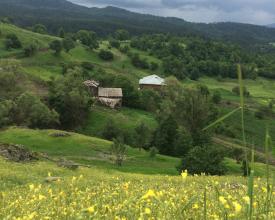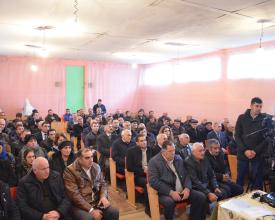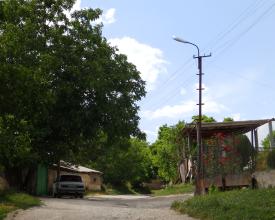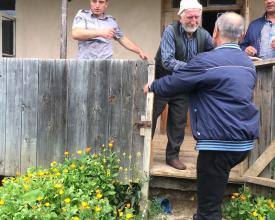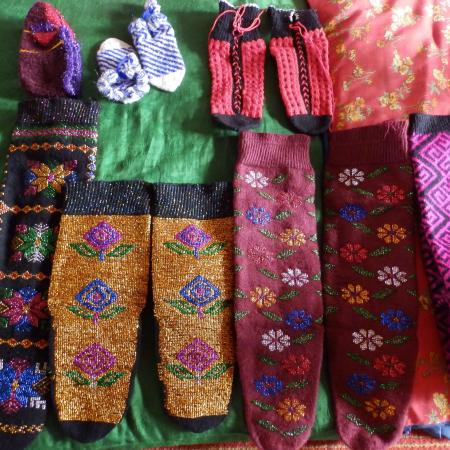
Community-based Landscape Conservation in Georgia
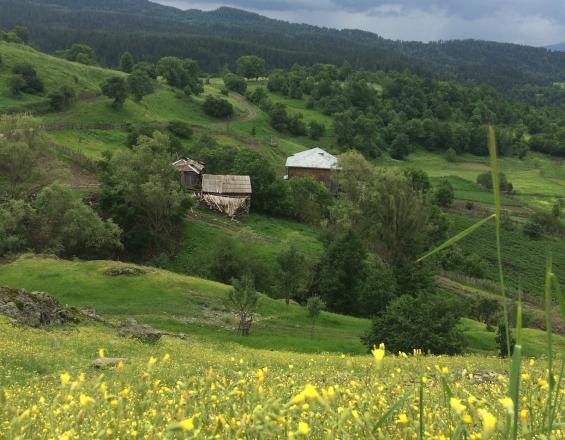
The Eco-Corridor Fund for the Caucasus (ECF) is a funding instrument supporting community-based biodiversity conservation in Georgia, Armenia and Azerbaijan. Eco-corridors are created by connecting various classifications of parks and protected areas across all three countries. ECF uses contractual nature conservation agreements and a clear set of processes to fund ecologically sustainable land use in specific regions and selected communities in Georgia. The result is an interconnected mosaic of managed and unmanaged habitats under various land categories and classifications. These community-managed landscapes protect, connect and support healthy native ecosystems while ensuring the socio-economic status of the communities involved is not harmed or diminish, but in many cases is improved. ECF is a not-for profit, practical conservation organization funded by KfW Development Bank and WWF Germany.
Context
Challenges addressed
By giving local people the training, education and decision-making power to participate in active landscape management, ECF is providing habitats and corridors large enough to sustain healthy populations of plants and animals without impeding local economics and traditional ways of life. The result is an interconnected mosaic of managed and unmanaged habitats under various land categories and management strategies, providing diverse ecosystem services including a solution to landscape fragmentation.
Through training and education ECF is improving local’s relationship and perspective towards wildlife, increasing awareness and fostering respect and pride for key species. Financial incentives linked to the “Financial Participatory Approach” help limit human-wildlife conflicts by providing funding for basic infrastructure like street lights and electric fences. ECF challenges the idea that nature conservation means a loss in economic value and activity.
Location
Process
Summary of the process
Each building block contributes to the signing of a Conservation Agreement (CA) and the accompanying 10-year habitat management plan.
- Identifying the priority conservation areas dictates the communities that can participate in the Financial Participatory Approach (FPA).
- Assessment of the readiness of each community is achieved through the Financial Participatory Approach (FPA) which is an inclusive and participatory tool designed to generate autonomous development strategies.
- The establishment of community-based organizations (CBOs), assist each community create a relationship with local NGO who will oversee the administrative aspects of a CA.
- Securing long term land-use rights for the community means that the local ranger program can provide ongoing wildlife monitoring, poaching prevention and coordinate sustainable land-use without the obstruction of land-use disputes.
- Signing a long-term Conservation Agreement puts to use all the data, research and community-strengthening practices from the previous steps and directs the community to reach the attainable and effective conservation objects.
Building Blocks
Identify priority conservation areas using habitat suitability models for key animal species.
Selecting 3-4 native animal species that best represent the landscape helps to embody the specific ecosystems in need of protection/management. Identifying target species allows ECF to create an approach to wildlife conservation that is easy for locals to understand - linking a charismatic species directly to landscape management practices - and helps provide locals with a tangible connection between their day-to-day conservation efforts and long-term landscape impacts. For example, if native grassland ecosystems are healthy, the Caucasian red deer will return even if they were previously locally extinct. The presence of these key native animal species is later used as an indicator of biodiversity when Conservation Agreements are created.
Using a combination of remote sensing and field data, a study of the existing and potential habitats of key species is performed. Using Maximum Entropy Modeling (MAXENT) software, habitat suitability models for each key species is created, resulting in maps showing the suitability of the habitats for key species. This approach allows locals to make a clear connection between conservation objectives, measures to be implemented and the expected impacts and helps set priorities for further studies and monitor the species/habitats.
Enabling factors
1. Access to current and accurate remote sensing landscape data – ESRI, USGA NOAA etc.
2. Trained and educated staff to use GIS and run modelling software
3. Combination of local and specialist data and knowledge on key species
4. Access to field data from NGOs who presently/previously worked in the region
Lesson learned
- Habitat suitability modelling offers a cost and time effective method to set geographic and thematic conservation priorities within a complex landscape.
- Even with limited availability of field observation data, the results are useful in the initial stages of planning, although the limitations of the quality of the input data needs to be kept in mind.
- Habitat suitability maps represent a good basis for discussion of conservation objectives, priorities and measures with various stakeholders, including the local population.
Financial Participatory Approach (FPA) tool
ECF’s Financial Participatory Approach (FPA) is a methodology which uses direct financial grants for mobilizing local populations to take charge of their own development. It is designed to generate autonomous development strategies which are constructive, inclusive and very participatory at family, community and regional levels.
Facilitated by local NGOs all across the Western Lesser Caucasus Corridor, storytelling competitions help describe the relationship between locals and the key wild animal species selected to best represent the landscapes and embody ecosystems in need of protection/management. This is followed by activities aimed to simultaneously improve animal habitats and human livelihoods, inparallel with habitat suitability models. The FPA process helps develop a positive, trust-based relationship between ECF and locals.
Participation in an FPA leads towards the development of ECF’s long-term conservation contract (Conservation Agreement) and encourages locals to become decision makers and stewards of natural resources while fostering a sense of pride/protection for key wildlife species. FPAs also address underlying land tenure/land-use issues that represent drivers of conservation problems (i.e. poaching, unsustainable/illegal resource use).
Enabling factors
- Availability of local NGOs with experience and capacity to facilitate community-based processes
- Support of the local authorities and other institutions through regional working groups
- Establishing a connection between traditional customs, communication patterns, decision making, and modern methodology while nurturing existing cultural and traditional values
- Implementation of financial incentives with no strings attached
- Providing on-demand capacity building and trainings to respond to emerging needs of local communities
Lesson learned
- Unconditional financial incentives attract initial interest in the project and later generat community pride, satisfaction and motivation after incentives are used to better the community.
- The methodology of FPAs requires adjustment to the purpose and objectives of each project.
- The implementation of small community-managed projects is key in determining which communities are engaged and competent to enter longer term cooperation.
- Incorporating traditional knowledge with modern models and strategies creates a fusion of science-based and community-based contributions.
- Land tenure issues are identified early and allow ECF to assess project viability.
- Introduction of basic civil society structures through the creation of village committees, self-coordinated regional working groups, regular monitoring of projects and annual meetings.
Establishment of community-based organizations (CBOs)
Establishing a CBO is the step between the FPA process and signing a Conservation Agreements. CBOs are created with ECF’s guidance and are responsible for:
i) securing and implementing a Conservation Agreement
ii) the fair and equitable distribution of benefits among the community
iii) acting as the legal entity representing the community in a Conservation Agreement.
CBOs are formed under the national law that is appropriate to its purpose, country and region. If creating a CBO is not possible, an NGO can act as a CBO in the Conservation Agreement.
To establish a CBO requires the local community to make a long-term commitment to cooperation and take responsibility for conservation actions. In this way the CBO contributes to strengthening the social capital and increasing sustainable land-use practices. CBO’s help build community connectedness, communication and resilience related to nature conservation efforts. CBOs are encouraged to consider biodiversity as part of the local economy and work closely with ECF toagree on sustainable land-use. CBOs are encouraged to seek other sources of funding for community projects and to develop their activities as a sustainable business during the implementation period of the Conservation Agreement.
Enabling factors
- Self-organisation of communities is initiated or strengthened through the FPA
- Negotiation of terms with representatives of the community to provide a clear, long-term Conservation Agreement
- Dialogue, negotiation and involvement with all segments of the community: elders, decision makers, influential community members, women and youth
- Identify and include all user groups within a community: herders, farmers, hunters, healers
- Involvement of local authorities (i.e.forest department)
- Strategic engagement with institutions at regional and national levels
Lesson learned
- Lack of community level governance, lack of environmental awareness and negative wildlife interactions required education/community awareness campaigns.
- Small, locally-led projects encourage community capacity building, communication and implementation of conservation strategies.
- Establishment of CBOs represents FPA progress and a qualitative improvement in terms of local self-organisation.
- Do not impose an organisation model on the local community; decide on a model together.
- Capacity building related to management and governance of CBOs is critical to secure initial success and reduce dependence on external support.
- Involvement of the CBO with acquisition and organization of baseline information on livelihood-related issues, natural resources and land-use secures relevant information and contributes to CBO’s capacity building.
- Accepting community members’ views when designing project goals ensures project serves entire community.
- Involvement of local governments link the applications of ecosystem-based management to larger themes like climate change and disaster risk reduction.
Securing long term land-use rights for the community and conservation objectives
Clear land ownership and land tenure (the right to use land) are the basic preconditions for the implementation of any habitat management measure. Land-use rights of all beneficiaries needs to be clear and secure before project initiatives commence to avoids risk of undocumented dimensions in the planning and implementation of conservation measures. It also secures long-term interest of the land user to manage the land sustainably. The purpose of this measure is to clarify, legally regulate, obtain and hold land tenure rights needed for conservation actions and for sustainable livelihood. Land tenure rights encompasses land ownership, lease of land and/or other rights related to the use of land.
In Georgia, most land is state owned. But after the breakdown of the Soviet Union land tenure rights have not been properly documented or registered. Today, traditional land-use rights based on verbal agreements and traditions are translated into legally documented/registered leases by the CBOs representing their respective villages. Resolving uncertain land tenure is one of the major benefits the ECF is bringing to partner communities, providing them with a clear economic perspective for the future while preserving the existing community management of shared pastures and meadows.
Enabling factors
- Readiness of state property authorities to document and register the existing community land use rights
- Completion of a land tenure study to understand the land tenure uncertainties and existing rights
- Accurate mapping of entire conservation area and communication of these findings (maps, figures, reports) accessible to the community and authorities
- Active involvement of local governments (municipality and department levels)
- Voluntary involvement of local authorities, departments and administration
- Proper compensation for land-use
Lesson learned
- Properly identify land-use rights and open issues including research, data collection and GIS analysis performed i) formally (municipal and regional data collection), and ii) informally (discussions with locals).
- Consideration of information documentation and lack of documentation. Locals may use pasturelands/meadows in a traditional way, with little or no documentation of their user rights. In the frame of the project, the land-use needs to be considered in both formal/political contexts and informal/traditional contexts.
- Communication between multiple land management bodies in Georgia (state, municipality, community, private) and land-use designations (forests, agricultural, protected areas, private land). Positive relationships and active communication with all stakeholders leads to healthy working relationships.
- Consideration of national and regional politics integral to securing land-use rights.
- Sufficient budgeting of costs required to obtain land-use rights.
Creation of a local ranger program
To effectively carry out conservation measures, projects require dedicated, skilled and trained people in the field and the community. The establishment of a local ranger program called “Caretakers” was identified by ECF as an important step in ensuring conservation objectives were enforced in the field and understood in the village. Caretakers are local people with knowledge and understanding of their local environment, the ability to communicate with locals and visitors, and self-motivated to protect nature. They are identified through the FPA process and later employed by CBOs. They are trained in conservation methods, equipped with communication equipment, uniforms and sometimes means of transport but do not have the legal rights of (governmental) protected area staff or forest rangers. They may inform and educate people, and report infringements to the relevant authorities. Caretakers assist with the monitoring of biodiversity, educate/raise awareness and perform CA management tasks. They are responsible for data collection, ongoing wildlife monitoring and the submission of progress reports to the ECF. Caretakers are a key point of contact (trusted and respected) in the community, and act as an example of the socio-economic benefits of nature conservation.
Enabling factors
- Prudent selection means chosen individuals are trusted, have the capacity to learn new skills, openness to accept new ideas, and responsibility to report/carry out objectives
- Involving caretakers in all aspects of capacity building with local institutions and authorities involved in land management and nature conservation, including forest agencies, municipalities etc.
- Participation in training sessions using the tools/skills required of the position as well as fostering strong ethics, honesty and commitment to the nature conservation objectives
Lesson learned
- Outmigration of young people is a barrier to finding a suitable Caretaker for long term project goals and application.
- Educating communities on ecosystem-based management practices and applications will challenge previous perspectives of wildlife while demonstrating how conservation can benefit the community and develop respect for the caretaker position.
- Community capacity building leads to a supportive atmosphere for caretakers to operate in. Local authorities and community organisations are institutionally weak so general institutional strengthening and capacity building is encouraged.
- The role of Caretakers is initially misunderstood by local and authorities. effort and coaching is required to establish the understanding that policing and enforcement represents only a minor part of the scope of work of stakeholders and that main emphasis should be on raising awareness, providing information and guidance, and leadership within the local community.
- Ensuring caretakers receive education and training means the tools and resources employed can be accessed and utilized.
Commitment to explicit, attainable conservation objectives through long-term Conservation Agreements
Conservation Agreements (CAs) are binding grant contracts created and agreed upon by specific communities and the ECF. CAs set out clear, attainable and realistic conservation objectives and determine the scope of conservation measures to be implemented within communities that demonstrate the have the organization, motivation and commitment to follow 10-year habitat management plans. Conservation objectives are determined by the ECF and the local community using expert and local knowledge. Each agreement is tailored to the identified needs in the target community and the local landscape. These contracts bind communities to protect ecosystems but also assist traditional land users to use the land in a sustainable way.
The communities that sign Conservation Agreements have been selected to do so because they show initiative, community involvement and potential through the FPA process and establishment of a CBO. In order to ensure the sustainability of the projects, the compliance of Conservation Agreements is monitored. Each community must submit annual technical reports. In case they fail to perform the planned activities, the payments under the agreement may be suspended until they meet the requirements, or subsequently terminated if they don’t comply for more than a year.
Enabling factors
- Successful application of the FPA; communities practice using tools, models, financing
- Development of a philosophy of support and education, not policing
- Careful selection of communities which demonstrate the skills, organization and involvement to commence conservation measures
- Providing training and education to make decisions and manage landscapes in cooperation with nature conservation ideals
- Clearly defining activities being paid for creates a sense of purpose for CBOs
- Assisting communities secure additional funding
Lesson learned
- Technical expertise is needed in very few cases for specific questions related to agreeing on habitat management plans.
- The cost estimates were developed in cooperation with the local community representatives based on their knowledge of local markets. The final result is that a fair full cost reimbursement is set by the conservation agreements that allows the CBOs to implement the Conservation Agreements and secure their economic sustainability over the contracted period.
- Annual community reports include: a comparison of targeted and actual values for the planned measures; developments in project time frames; general financial report; information on problems and identification of possible solutions.
- Each year a sample of conservation agreements are selected for independent audit of performance by ECF or a third party. This is an opportunity to examine monitoring and reporting as a method to test performance of the conservation agreement process.
- Examining connections between conservation objective and resilience/livelihoods of locals helps direct future projects.
Impacts
ECF is improving habitat connectivity in the Caucasus by combining local knowledge and community action with scientific data and modern land-use management practices. The creation of eco-corridors link parks and protected areas, contributing to the preservation of biodiversity inside and outside protected areas and across national borders. The “Financial Participatory Approach” is a community-based approach that works in parallel with landscape models. This process helps ECF identify communities that are ready to commit to conservation goals while simultaneously developing a trust-based relationship. This is the first step towards a “Conservation Agreement” and has positive, trickle-down effects that empower locals to become decision makers and stewards of natural resources while developing pride and protection for key species. Improved pastoral and agrarian productivity and financial incentives encourage the marriage of conservation and community well-being. Conservation Agreements reward and empower locals to preserve nature and local culture, leading to the creation of community-based conservation organizations and sustainable land-use plans that consider biodiversity as and local economy. Specific monitoring process are implemented, including assigning “Caretakers” who monitor/track wildlife movement and enforce anti-poaching laws.
Beneficiaries
Benificiary Villages:Dertseli, Mokhe, Naminauri, Tsikhisubani
Furture benificiary villages:Didi Zanavi,Patara Zanavi,Gomaro,Nakurdevi, Khevasheni,Bolajuri,Kvemo Enteli,Chorchani,Didi Smada,Patara Smada, Tsre,Pkhero, Shoka,Zemo Enteli,Kikibo
Sustainable Development Goals
Story

The Adigeni region of Georgia and ECF’s Western Lesser Caucasus Eco-Region is known for historic monasteries and ancient metallurgy. Dehrseli is a small community within the region that was identified as candidate for the ECF programme. Over a year ago the community took part in ECF’s Financial Participatory Approach (FPA) a process which aids ECF administration to evaluate if a community is open to and capable of committing to a Conservation Agreement. Zaza Shavadze is a respected community leader in Dertseli and a member of the Dertseli Community Union board. His family and community are one example of the positive effects of ECF’s programme.
The FPA offers financial incentive to a community as a reward for taking specific steps preparing them to enter into a Conservation Agreement in the future. Some of these steps include creating a collaboration with a partner NGO or institution to oversee progress, developing a capacity for community leadership and ensuring there is community involvement on multiple levels – from school children to community decision makers. The financial award has no parameters attached and the community may use the money for any use; from installing street lighting to improving road conditions. Some communities, like Dehrseli, have been encouraged by the increase in tourism to the area and are working on creating further economic opportunities related to tourism. A group of women in the Dehrseli community have started making socks which they sell to tourists and at local markets.
The FPA tool helps develop a level of trust between the community and ECF, demonstrating that ECF isn’t about policing or reducing economic activities related to land use, but about fostering a friendship and trust-based partnership where the good of the community is integrated into wildlife conservation objectives. The goal of ECF as a whole is to contribute to ecological conservation in the Caucasus without reducing the income of rural populations and the FPA has proved to be a key stepping stone to reaching this goal.

